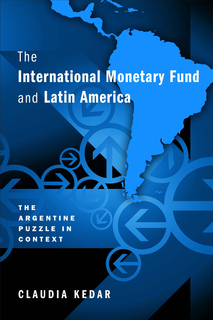The International Monetary Fund and Latin America
The Argentine Puzzle in Context
Included in the KU Select 2020 Backlist Collection
The International Monetary Fund (IMF) has played a critical role in the global economy since the postwar era. But, claims Claudia Kedar, behind the strictly economic aspects of the IMF's intervention, there are influential interactions between IMF technocrats and local economists—even when countries are not borrowing money. In The International Monetary Fund and Latin America, Kedar seeks to expose the motivations and constraints of the operations of both the IMF and borrowers. With access to never-before-seen archive materials, Kedar reveals both the routine and behind-the-scenes practices that have depicted International Monetary Fund-Latin American relations in general and the asymmetrical IMF-Argentina relations in particular. Kedar also analyzes the "routine of dependency" that characterizes IMF-borrower relations with several Latin American countries such as Chile, Peru, and Brazil. The International Monetary Fund and Latin America shows how debtor countries have adopted the IMF's policies during past decades and why contemporary Latin American leaders largely refrain from knocking at the IMF's doors.
Metadata
- isbn978-1-4399-0910-2
- publisherTemple University Press
- publisher placePhiladelphia, PA
- restrictionsCC-BY-NC-ND
- rightsCopyright 2013. Available under a CC-BY-NC-ND license.
- rights holderTemple University Press


